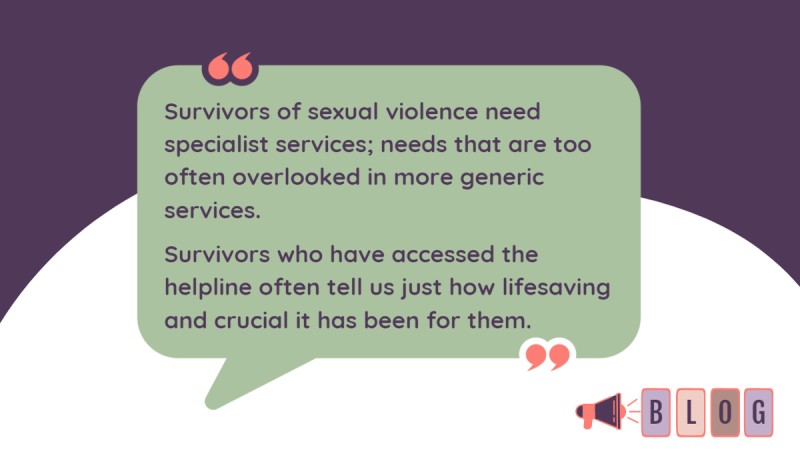Blog
Supporting LGBTQ+ Survivors
-800.png)
Reaching out to a helpline can be difficult for anyone, and we know that LGBTQ+ survivors can face additional barriers to support which can make reaching out that bit harder.
The Rape Crisis Scotland helpline supports survivors of all genders and sexualities. Every person that contacts our helpline, regardless of their background or identity, is met with specialised support tailored to their individual needs.
We're proud to be inclusive, and we want all survivors to know that our helpline is a safe space. We spoke with Annie and Rona, two Support Workers from our helpline team, to find out what they want LGBTQ+ survivors to know.
How do you create a safe space for LGBTQ+ survivors?
Annie: We don’t make assumptions about any survivors, and that includes assumptions about their gender and sexuality, the gender of their partner and the nature of the assault. We let survivors lead and we just ask for as much information as we need to be able to support them.
Rona: We always follow a survivor’s lead on language and if somebody mentions their gender, we will ask them if they would feel comfortable sharing their pronouns, and that can help. It seems like a tiny thing but it can be huge, and it can really create that safe space just by asking that. I definitely have had the experience of asking someone their pronouns and you can almost feel the comfort that we are meeting them where they’re at.
Annie: We also have training in supporting LGBTQ+ survivors, so we have an understanding of the specific barriers that can come up and we have sensitivity to that.
Annie: Sexual violence can impact all areas of your life, and survivors will contact us to discuss how it has affected their relationships, sex life or sexuality. The helpline is a safe space to talk about sexuality and we’re trained to talk about it.
Specialist sexual violence services save lives

“The helpline saved my life
on several occasions after I was raped. The first person I told was a helpline
worker.”
The recently published Independent Strategic Review of Funding and Commissioning of VAWG Services in Scotland made a number of positive recommendations for how services designed to target violence against women and girls are funded and delivered, including making the right to access these services a statutory one.
3 reasons why writing to our helpline might work for you
-1682324273-0-800.png)
Reaching out to a helpline can be difficult. When you feel ready to take that step, there are lots of different ways to get in touch.
What is the Rape Crisis Scotland helpline?
We run a helpline for anyone aged 13+ affected by sexual violence, no matter what happened or how long ago. Helpline Support Workers offer initial, short-term, and crisis support, and can make referrals to your local Rape Crisis Centre for longer-term support.
The helpline is open daily from 5pm - midnight, 365 days a year. We support people of all genders, and can provide support and information to family, friends and supporters too.
5 Things You Need To Know About Our Helpline Webchat

Our national helpline provides initial and short-term support to anyone aged 13+ affected by sexual violence. No matter what happened or when, we’re here.
1. What is it?
After a successful pilot, we have permanently added a webchat support service to our national helpline, giving anyone thinking of reaching out to us a new way to get in touch.
The Vulnerability of Women With No Recourse to Public Funds, Sexual Violence and Exploitation
We live in a country that speaks so much of being tolerant, inclusive, and welcoming but this does not always match up with what is happening on the ground.
There are women in Scotland who have fled all sorts of dangers who are navigating life in this country whilst struggling with the traumas associated to being trafficked for sex, being subjected to marital rape, the victimhood of war related rape and sexual assault and other forms of sexual violence. The harsh reality is that immigration policy dictates that many of these women do not qualify to stay in women’s refuges or temporary accommodation.
Most of us assume that women’s organisations would be able to support us should we need it. Yet, people working in these organisations know that harsh immigration policy means that not everyone is able to access support. What do I mean by that? Not having the “correct” immigration status impacts on the kind of help available.